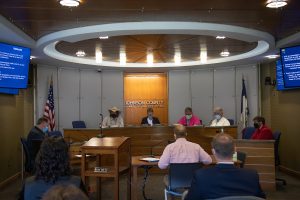Iowa Climate Statement recommends stronger electric infrastructure
The statement, released by the University of Iowa’s Center for Global and Regional Environmental Research on Wednesday, focuses on strengthening Iowa’s electric infrastructure for future climate disasters.
Dr. Eugene Takle, Director of the Climate Science Program at Iowa State University, speaks at the 2021 Climate Statement over zoom on Wednesday, Oct. 13, 2021.
October 13, 2021
The University of Iowa’s Center for Global and Regional Environmental Research is recommending better electrical infrastructure after the 2020 derecho and future natural disasters.
At a Wednesday press conference, David Courard-Hauri, Chair of Environmental Science and Sustainability at Drake University, said the 2020 derecho devastated electrical infrastructure in many parts of Iowa — most notably the electrical outages Iowa residents experienced that lasted for up to two weeks after the storm.
“It’s not a surprise that we weren’t prepared for that, since it was unprecedented,” Courard-Hauri said.
The climate statement briefly outlined solutions that can be used in Iowa to prevent or mitigate the effects of another intense storm like the derecho or the effects of climate change.
Systems Engineering Professor at Iowa State University James McCalley said at the conference that the most important steps that Iowa can take is introducing microgrids — small power grids that can operate independently from the main system in adverse conditions — and hardening current infrastructure with stronger materials to ensure it can withstand severe storms.
RELATED: Climate activists react with skepticism to annual climate statement
President Joe Biden’s new infrastructure bill, which is being deliberated in the U.S. House of Representatives, would help fund some of the projects outlined in the Iowa Climate Statement. In particular, it would help fund the improvement of electrical grids while also making electrical generation more sustainable.
“If it gets passed — we hope it will — there’s a lot of funds that will be coming into Iowa and other states to support this kind of activity,” McCalley said.
Jerry Schnoor, the Center for Global and Regional Environmental Research’s co-director at the University of Iowa, said at the conference that the expansion of electric infrastructure is not just about ensuring the technology to withstand severe weather events and climate change, but also provides the infrastructure needed to generate energy for the increasing adoption of electric vehicles.
“We benefit in so many ways from strengthening our energy infrastructure, and, at the same time, we help to address climate change,” Schnoor said.






